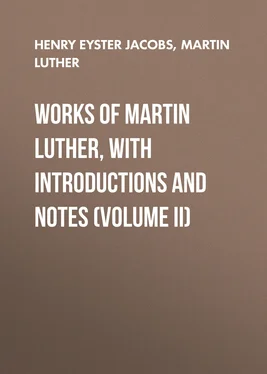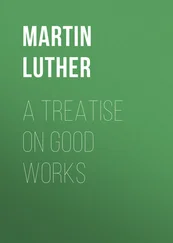Henry Eyster Jacobs - Works of Martin Luther, with Introductions and Notes (Volume II)
Здесь есть возможность читать онлайн «Henry Eyster Jacobs - Works of Martin Luther, with Introductions and Notes (Volume II)» — ознакомительный отрывок электронной книги совершенно бесплатно, а после прочтения отрывка купить полную версию. В некоторых случаях можно слушать аудио, скачать через торрент в формате fb2 и присутствует краткое содержание. Жанр: foreign_prose, foreign_religion, Философия, foreign_psychology, foreign_antique, на немецком языке. Описание произведения, (предисловие) а так же отзывы посетителей доступны на портале библиотеки ЛибКат.
- Название:Works of Martin Luther, with Introductions and Notes (Volume II)
- Автор:
- Жанр:
- Год:неизвестен
- ISBN:нет данных
- Рейтинг книги:3 / 5. Голосов: 1
-
Избранное:Добавить в избранное
- Отзывы:
-
Ваша оценка:
- 60
- 1
- 2
- 3
- 4
- 5
Works of Martin Luther, with Introductions and Notes (Volume II): краткое содержание, описание и аннотация
Предлагаем к чтению аннотацию, описание, краткое содержание или предисловие (зависит от того, что написал сам автор книги «Works of Martin Luther, with Introductions and Notes (Volume II)»). Если вы не нашли необходимую информацию о книге — напишите в комментариях, мы постараемся отыскать её.
Works of Martin Luther, with Introductions and Notes (Volume II) — читать онлайн ознакомительный отрывок
Ниже представлен текст книги, разбитый по страницам. Система сохранения места последней прочитанной страницы, позволяет с удобством читать онлайн бесплатно книгу «Works of Martin Luther, with Introductions and Notes (Volume II)», без необходимости каждый раз заново искать на чём Вы остановились. Поставьте закладку, и сможете в любой момент перейти на страницу, на которой закончили чтение.
Интервал:
Закладка:
To my way of thinking it would be a necessary measure, especially in these perilous times of ours, that all foundations and monasteries should be re-established as they were at the first, in the days of the Apostles and for a long time afterwards, when they were all open to every man, and every man might remain in them as long as he pleased. For what were the foundations and monasteries except Christian schools in which the Scriptures and Christian living were taught, and people were trained to rule and to preach? So we read that St. Agnes 253 253 St. Agnes the Martyr, put to death in the beginning of the IV Century, one of the favorite saints of the Middle Ages. See Schäfer, L. als Kirchenhistoriker , p. 235.
went to school, and we still see the same practice in some of the nunneries, like that at Quedlinburg 254 254 One of the most famous of the German convents, founded in 936.
and others elsewhere. And in truth all monasteries and convents ought to be so free that God is served in them with free will and not with forced avarice. Afterward, however, they hedged them about with vows and turned them into a lifelong prison, so that these vows are thought to be of more account than the vows of baptism. What sort of fruit this has borne, we see, hear, read and learn more and more every day.
I suppose this advice of mine will be regarded as the height of foolishness; but I am not concerned about that just now. I advise what I think best; let him reject it who will! I see how the vows are kept, especially the vow of chastity, which has become so universal through these monasteries and yet is not commanded by Christ; on the contrary, it is given to very few to keep it, as He himself says [Matt. 19:11 ff.], and St. Paul [1 Cor. 7:7, Col. 2:20]. I would have all men to be helped, and not have Christian souls caught in human, self-devised customs and laws.
[Sidenote: Marriage of the Clergy]
14. We also see how the priesthood has fallen, and how many a poor priest is overburdened with wife and child, and his conscience troubled, yet no one does anything to help him though he might easily be helped. Though pope and bishops may let things go as they go, and let them go to ruin if they will, I will save my conscience and open my mouth freely, whether it vex pope, bishops or any one else. Wherefore I say that according to the institution of Christ and the Apostles every city should have a priest or bishop, as St. Paul clearly says in Titus i [Tit. 1:6]; and this priest should not be compelled to live without a wedded wife, but should be permitted to have one, as St. Paul says in I Timothy iii, and Titus i, "A bishop should be a man who is blameless, and the husband of but one wedded wife, whose children are obedient and virtuous," etc. [1 Tim. 3:2, Tit. 1:6] For with St. Paul a bishop and a priest are one and the same thing, as witness also St. Jerome 255 255 The celebrated Church Father (died 420). The passages referred to are in Migne , XXII, 656, and XXVI, 562.
. But of bishops as they now are, the Scriptures know nothing; they have been appointed by the ordinance of the Christian Church, that one of them may rule over many priests.
So then we clearly learn from the Apostle that it should be the custom for every town to choose out of the congregation 256 256 Or "community" ( Gemeine ). Cf. The Papacy at Rome , Vol. I. p. 345, note 4. See also Dass eine christl. Gemeine Recht und Macht habe , etc. Weimar Ed. XI, pp. 408 ff.
a learned and pious citizen, entrust to him the office of the ministry, and support him at the expense of the community, leaving him free choice to marry or not. He should have with him several priests or deacons, who might also be married or not, as they chose, to help him rule the people of the community 257 257 Or "congregation." See note 2.
by means of preaching and the sacraments, as is still the practice in the Greek Church. At a later time 258 258 i. e.. At a time later than that of the Apostles.
, when there were so many persecutions and controversies with heretics, there were many holy fathers who of their own accord abstained from matrimony, to the end that they might the better devote themselves to study and be prepared at any time for death or for controversy. Then the Roman See interfered, out of sheer wantonness, and made a universal commandment forbidding priests to marry 259 259 The first absolute prohibition of marriage to the clergy is contained in a decree of Pope Siricius and dated 385. See H. C. Lea, History of Sacerdotal Celibacy , 3d ed. (1907), I, pp. 59 ff.
. This was done at the bidding of the devil, as St. Paul declares in I Timothy iv, "There shall come teachers who bring doctrines of devils, and forbid to marry." From this has arisen so much untold misery, occasion was given for the withdrawal of the Greek Church 260 260 The priests of the Greek Church are required to marry, and the controversy over celibacy was involved in the division between the Greek and Roman Churches.
, and division, sin, shame and scandal were increased without end,—which is the result of everything the devil does.
What, then, shall we do about it? My advice is that matrimony be again made free 261 261 Cf. Hutten's Vadiscus (Böcking, IV, 199).
, and that every one be let free choice to marry or not to marry. In that case, however, there must be a very different government and administration of Church property, the whole canon law must go to pieces and not many benefices find their way to Rome 262 262 i. e., Lie in Roman appointment.
. I fear that greed has been a cause of this wretched unchaste chastity, and as a result of greed every man has wished to become a priest and everyone wants his son to study for the priesthood, not with the idea of living in chastity, for that could be done outside the priesthood, but of being supported in temporal things without care or labor, contrary to the command of God in Genesis iii, "In the sweat of thy face shat thou eat thy bread." [Gen. 3:19] They have construed this to mean that their labor was to pray and say mass.
I am not referring here to popes, bishops, canons and monks. God has not instituted these offices. They have taken burdens on themselves; let them bear them. I would speak only of the ministry which God has instituted 263 263 i. e., The ministry in the congregation. See above, p. 119.
and which is to rule a congregation by means of preaching and sacraments, whose incumbents are to live and be at home among the people. Such ministers should be granted liberty by a Christian council to marry, for the avoidance of temptation and sin. For since God has not bound them, no one else ought to bind them or can bind them, even though he were an angel from heaven [Gal. 1:8], still less if he be only a pope; and everything that the canon law decrees to the contrary is mere fable and idle talk.
Furthermore, I advise that henceforth neither at his consecration to the priesthood nor at any other time shall any one under any circumstances promise the bishop to live in celibacy, but shall declare to the bishop that he has no authority to demand such a vow, and that to demand it is the devil's own tyranny.
But if anyone is compelled to say or wishes to say, as do some, "so far as human frailty permits," 264 264 Quantum ragilitas humana permittit . A qualification of the vow.
let everyone frankly interpret these words negatively, to mean "I do not promise chastity." 265 265 i. e., Celibacy. Non promitto castitatem .
For human frailty does not permit a chaste life 266 266 Fragilitas humana non permittit caste vivere .
, but only angelic power and celestial might[2 Pet. 2:11] 267 267 Angelica fortitudo at coelestis virtus .
Thus he should keep his conscience free from all vows.
Интервал:
Закладка:
Похожие книги на «Works of Martin Luther, with Introductions and Notes (Volume II)»
Представляем Вашему вниманию похожие книги на «Works of Martin Luther, with Introductions and Notes (Volume II)» списком для выбора. Мы отобрали схожую по названию и смыслу литературу в надежде предоставить читателям больше вариантов отыскать новые, интересные, ещё непрочитанные произведения.
Обсуждение, отзывы о книге «Works of Martin Luther, with Introductions and Notes (Volume II)» и просто собственные мнения читателей. Оставьте ваши комментарии, напишите, что Вы думаете о произведении, его смысле или главных героях. Укажите что конкретно понравилось, а что нет, и почему Вы так считаете.












